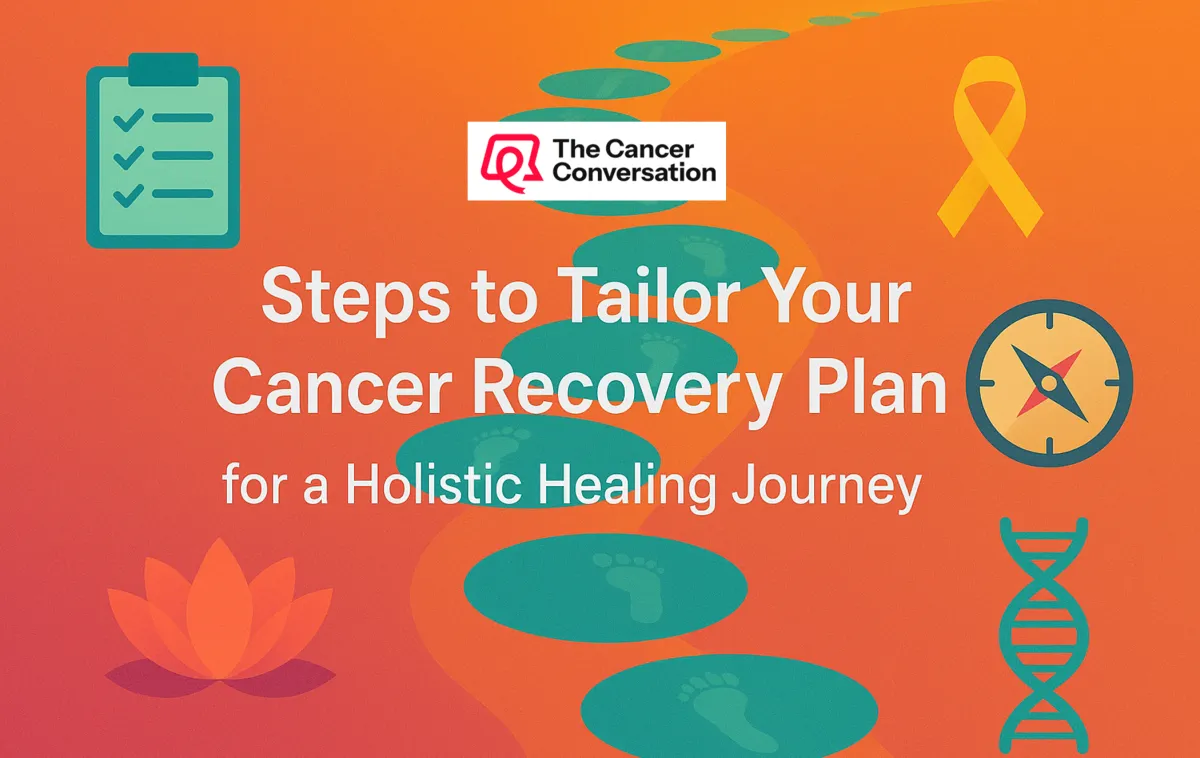
Steps to Tailor Your Cancer Recovery Plan for a Holistic Healing Journey
Navigating a cancer diagnosis can feel overwhelming, but you're not alone. Crafting a personalized cancer recovery plan is more than just a treatment path—it's about embracing a holistic healing journey that nurtures both body and mind. By integrating natural and conventional therapies, you can enhance your resilience and well-being. In this guide, you'll find steps to tailor a recovery plan that aligns with your unique needs, ensuring a supportive and empowering journey. Explore The Cancer Conversation's 12-Step Cancer Recovery Program to start tailoring your own personalized plan today. For more information, you can visit here.# Steps to Tailor Your Cancer Recovery Plan for a Holistic Healing Journey
Navigating a cancer diagnosis can feel overwhelming, but you're not alone. Crafting a personalized cancer recovery plan is more than just a treatment path—it's about embracing a holistic healing journey that nurtures both body and mind. By integrating natural and conventional therapies, you can enhance your resilience and well-being. In this guide, you'll find steps to tailor a recovery plan that aligns with your unique needs, ensuring a supportive and empowering journey. Explore The Cancer Conversation's 12-Step Cancer Recovery Program to start tailoring your own personalized plan today.
Creating Your Cancer Recovery Plan

Understanding your unique needs is crucial in forming a cancer recovery plan that truly resonates with you. Everyone's experience with cancer is different, and acknowledging your individual journey is the first step towards personalized cancer care.
Understanding Your Unique Needs
Identifying Your Priorities: Begin by reflecting on your personal priorities and health goals. Consider what aspects of your life are most important to you, such as work, family, or personal passions.
Medical History Evaluation: Collaborate with your healthcare team to evaluate your medical history and current health condition. This includes understanding the specifics of your diagnosis, treatment options, and potential side effects.
Emotional and Psychological Considerations: It's essential to take into account the emotional and psychological dimensions of your cancer experience. This might involve assessing your mental health needs and reaching out for counseling or support groups if necessary.
Blending Conventional and Natural Treatments
A balanced approach to cancer treatment involves integrating both conventional and natural therapies. This can optimize your healing process while minimizing side effects.
Consultation with Healthcare Providers: Discuss with your oncologist about combining traditional treatments like chemotherapy or radiation with natural therapies such as acupuncture, dietary changes, or herbal supplements.
Research and Resources: Utilize reputable sources like Mayo Clinic or Stanford Medicine to research potential natural treatments and their compatibility with your current care plan.
Monitoring and Adjustments: Regularly monitor your progress and be open to adjusting your treatment plan as needed. Engage with your healthcare team to ensure that all therapies work in harmony.
Emphasizing Mind-Body Wellness

Focusing on mind-body wellness is an integral part of holistic cancer treatment. It supports emotional resilience and mental health, which are key components of recovery.
Techniques for Emotional Resilience
Building emotional resilience involves developing skills to manage stress and cope with the emotional challenges of cancer.
Mindfulness and Meditation: Incorporate mindfulness practices and meditation into your daily routine. These techniques can help in reducing stress and enhancing emotional balance.
Expressive Arts Therapy: Engage in creative activities like painting, music, or writing to express emotions and foster personal insight.
Supportive Counseling: Professional counseling can offer strategies to build resilience and navigate emotional hurdles. Consider joining support groups for shared experiences and encouragement.
Practices for Mental Health Support
Maintaining mental health is vital for overall well-being during cancer treatment. There are various practices to support your mental health journey.
Regular Physical Activity: Exercise can significantly improve mood and energy levels. Consider gentle activities like walking, yoga, or tai chi.
Healthy Nutrition: A balanced diet supports both physical and mental health. Consult a nutritionist to tailor a diet plan that meets your needs.
Cognitive Behavioral Therapy (CBT): CBT can be effective in addressing anxiety or depression. Discuss with a mental health professional about incorporating CBT into your care plan.
Integrating Support Systems

Building a strong support system is essential for navigating the complexities of cancer treatment and recovery.
Building a Caregiver Network
A reliable caregiver network is crucial for practical and emotional support.
Identify Potential Caregivers: Consider family members, friends, or professional caregivers who can assist you.
Define Responsibilities: Clearly outline what each caregiver's role will be, from transportation to emotional support.
Establish Communication: Maintain regular communication to ensure everyone is informed and feels valued in their role.
Engaging in Community Resources
Community resources can offer additional support and connections for those on the cancer recovery path.
Local Support Groups: Join local cancer support groups to share experiences and gain insights from others in similar situations.
Online Forums: Participate in online communities for broader perspectives and advice. Websites like Cleveland Clinic offer valuable information.
Workshops and Events: Attend workshops and events focused on cancer recovery to learn new coping strategies and meet others on the same journey.
By focusing on these elements, you can create a comprehensive cancer recovery plan that nurtures both your body and mind, empowering you through this challenging time. Remember to explore The Cancer Conversation's 12-Step Cancer Recovery Program for additional guidance and support. 🌟







